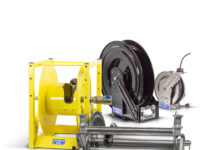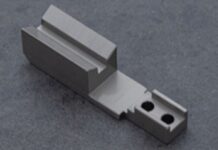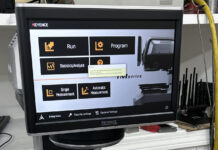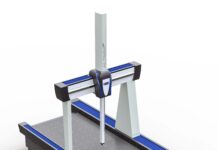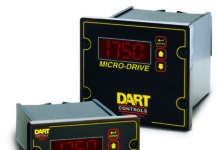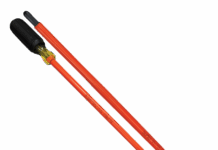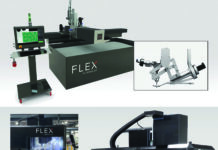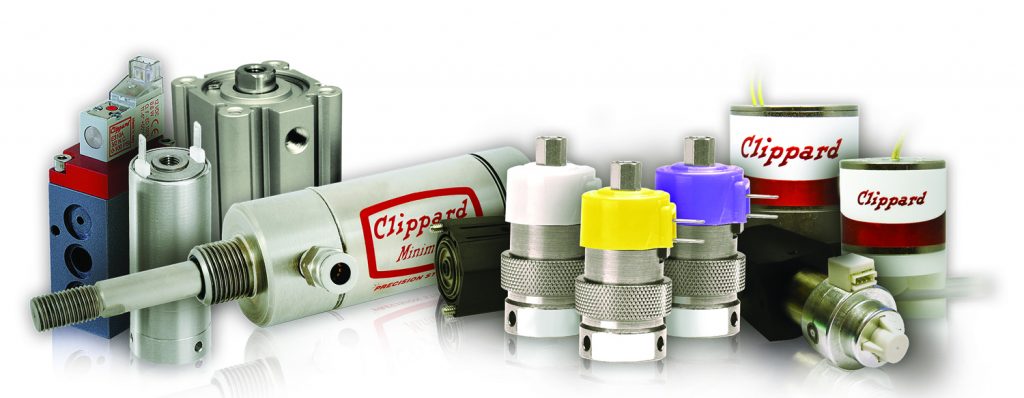
Clippard (Cincinnati, Ohio) is a world leader in fluid control products and other high-precision components, and the company prides itself on having been vertically integrated for decades, since its founding in 1941. The company operates two ISO certified manufacturing locations in Ohio and does advanced machining of all types to produce its extensive catalog of standard and custom product solutions for a myriad of markets worldwide. At the heart of its machining capabilities are 12-axis CNC Swiss machines, CNC milling centers and CNC wire EDM’s, plus numerous post-finishing operations, including anodizing, EN plating and thermal deburring. Various metal and thermoplastic materials are machined.
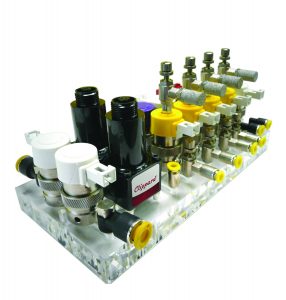 Recently, after extensive discussions with a local EDM supply distributor, a proprietary hybrid coated brass wire was presented to the Clippard Director of Operations, Robin Rutschilling and his CNC/EDM Programmer, Trevor McCoy by Barry Ramsay of Global Innovative Products (hereafter GIP), a Mason, Ohio supplier of consumables for EDM shops through their GIP distributor network, who also produces a variety of its own products for need-specific operations in electrical discharge machining. One such product is a PLASMA hybrid coated brass wire, comprising of a gamma-phase intermetallic zinc alloy coated wire with brass core. This proprietary GIP innovation had proven out in numerous lab testings but needed “real world” production validation. Barry Ramsay and GIP application engineer Brad Hansard approached the team at Clippard.
Recently, after extensive discussions with a local EDM supply distributor, a proprietary hybrid coated brass wire was presented to the Clippard Director of Operations, Robin Rutschilling and his CNC/EDM Programmer, Trevor McCoy by Barry Ramsay of Global Innovative Products (hereafter GIP), a Mason, Ohio supplier of consumables for EDM shops through their GIP distributor network, who also produces a variety of its own products for need-specific operations in electrical discharge machining. One such product is a PLASMA hybrid coated brass wire, comprising of a gamma-phase intermetallic zinc alloy coated wire with brass core. This proprietary GIP innovation had proven out in numerous lab testings but needed “real world” production validation. Barry Ramsay and GIP application engineer Brad Hansard approached the team at Clippard.
As the product had been found suitable for all types of wire machines, with excellent auto-threading capability and increased performance, even at conventional brass wire settings, Ramsay felt confident the product would outperform what Clippard was currently using in its EDM shop, including other GIP wire. This new product was being offered in 0.008”, 0.010” and 0.012” (20mm, 25mm and 30mm) diameters, so Ramsay proposed giving the Clippard EDM department a supply for testing on one of its Fanuc wire machines.
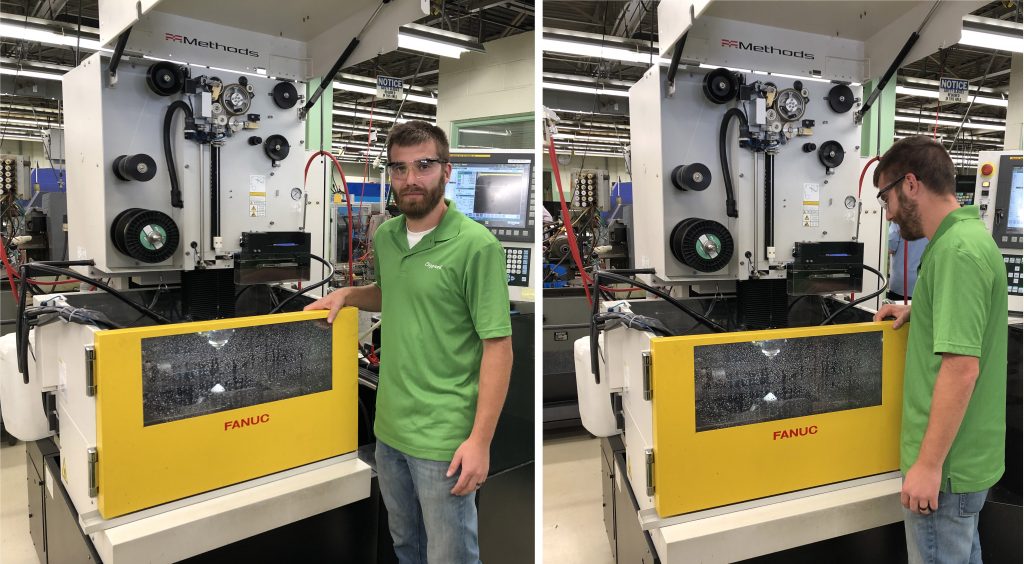
Gamma phase brass is a brittle intermetallic alloy (Cu5Zn8) with a high zinc content (approximately 65% Zn) which can also be synthesized by a diffusion anneal. However, when such coatings are wire drawn subsequent to the diffusion anneal, the coating will fracture due to its brittleness and redistribute around the wire circumference creating a discontinuous layer sometimes described as a “porous layer”, which promotes turbulent flow enhancing the flushing of debris. However, it is zinc enrichment created at the surface combined with the elevated melting point of CuZn gamma phase (approximately 800ºC/1472ºF) which are the biggest factors contributing to the performance of Gamma Phase Brass coated wire.
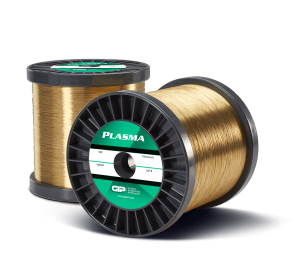
The arrangement between the two companies actually began in a somewhat unconventional manner, as Trevor McCoy relates. “We have an Ocean hole popper (electrode/sinker EDM) and the circuit boards needed repair. Brad was able to do that kind of work, which I knew from previous experiences with him. So, he proposed exchanging the board servicing for the opportunity to test the GIP hybrid PLASMA wire. Seemed reasonable to us, so we agreed.” The FANUC wire EDM in the shop at Clippard seemed an ideal candidate for GIP, as well, as Barry Ramsay notes, “We knew they were running all types of materials and some very high-precision tooling used in their own machine shop for the production of various pneumatic components with very tight tolerances. It seemed a very good place to test our new wire, which had been proven out on our own EDM’s at GIP.” He further says it was a handshake deal, a “classic collaboration between two companies for their mutual benefit,” adding that application engineering supplied by GIP further enhanced the use of the product at Clippard, as the test learning process information was shared without reservation, so both companies benefited.
In this test case, many of the components were being run for the production of special parts being produced by Clippard for robotic arm articulation.
The testing immediately yielded positive results, as McCoy notes they were holding tolerances under a tenth, with a microfinish that was very important for the application. “We do a lot of custom work for our own use, over 50% of my production in EDM. Some of the hard tool steels are difficult to drill and we also run various others. The jobs require a lot of setup time and fixturing, so run time, finish and wire breaks all are critical for us.”

The goals for this proprietary wire testing were three, according to Barry Ramsay. “The characteristics of the PLASMA wire in production on the FANUC machine at Clippard were important, as the flushing of their precision components directly impacts quality. Further, we had our own test results galore but needed an outside house to validate what we were seeing. Lastly, we just wanted to help our friends at Clippard, who had been so cooperative and, in this case, needed our help with those circuit boards. It was a classic win-win for both of us, as all three goals were met.”
Multiple parts were EDM’d during the testing of this PLASMA wire, with full comparative data tracked on the test wire vs. conventional brass. One tool for a medical part was produced, for example, in :56 vs. 1:05 with five skim passes, a 16% improvement in overall production. McCoy notes, “We could apply more power to run faster. The GIP product consistently outperforms premium brass, based on my experience with both now.” He also cited a very practical advantage. “The PLASMA wire is as clean as conventional brass.” Ramsay adds the price point is also competitive, so there’s less of a premium to achieve these enhanced results.





